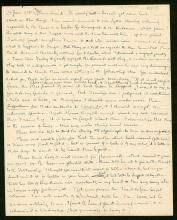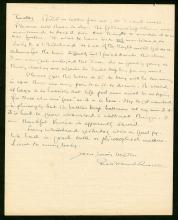BRACERS Record Detail for 46921
To access the original letter, email the Russell Archives.
The initials "CH" are at the top of the letter. Begun on the 24th of June, the letter continues on the following day, a Tuesday.
The letter contains a message to Ottoline Morrell. Frank is also instructed to "give this letter to E. to bring with her tomorrow, in case there are any points in it to discuss".
BR writes: "I try to get interested in philosophy but the battles keep battering at my mind and it is hard to get interested in abstract things. I am thankful Venice is apparently saved."
Russell has seen Wildon Carr on Friday and Whitehead earlier today (the 24th).
Frank is to pass thanks to Desmond MacCarthy; also brief instructions for Miss Kyle are given.
There are several transcriptions of this letter:
Document .079979 and its carbon, .079979a, both described in record 116618.
Document .079980, record 116619.
Document .201173, record 116620 and its carbon .201189, record 116621 (messages omitted).
Document .201199, record 116622 (messages omitted).
There is a brief extract in a mimeo, document .080038ag, record 117608.
Letter 27
BR TO FRANK RUSSELL, 24–25 JUNE 1918
BRACERS 46921. ALS. McMaster
Previous Brixton letter, BRACERS 19315; next letter, BRACERS 19334
Edited by K. Blackwell, A. Bone, N. Griffin and S. Turcon
<Brixton Prison>1
24 June 1918.
Dear Frank
The weekly letter2 has not yet come but I will start on other things. I am much amused to see Lytton Strachey solemnly reproved by the Times3 in a leader for disrespect to the Victorians — what fame! The odd thing is that I agree more with the Times than with him — up to a point. I always forget everything I mean to ask when visitors come. I want to know what is happening to Sanger, Bob Trevy, and Eliot as regards the Man Power Act.4 Please thank Desmond MacCarthy warmly for 3 books, which I devoured and enjoyed greatly. — I saw Carr Friday and greatly enjoyed the chance to talk shop; a certain amount of shop talk is indispensable in philosophy. On personal matters he was very discouraging. He seemed to think there was nothing in the fellowship idea. You understood, didn’t you, that its financial aspect was quite secondary? If it is not useful from the other point of view it had better be dropped. [Later] Have now seen Whitehead, and I feel definitely I wish it dropped.a I want to say, to you and to my friends in general, that I realize one’s judgment is worthless while one is here, and therefore I should never make more than suggestions for those outside to consider, and I should accept an adverse opinion. I feel I have thought enough about my own concerns since I came here — it is time to forget about them. I also realize that there is the reverse of hurry — time may make things much easier.
Please tell Miss Kyle to send the Dewey MS and typescript5 to Carr as soon as possible.
Please send word to Garsington that the mathematical book6 arrived quite safely and I was very glad to get it — but in general, if a book is of any value, it is better in these days to send it by hand than by post.
Please thank Lady O. most warmly for flowers etc. which arrived and gave me great joy. The Irises are splendid still. Please tell her not to give another thought to the Fellowship. I thought you would not want to bother about it, but as you don’t mind it is better in your hands, but it had betterb be dropped altogether. Tell her bits of Beethoven are constantly in my head — I am very sorry she no longer enjoys gardening etc. — I get more pleasure than I used to from bright colours. I am not worthy of Rimbaud, tell her. I am sorry, but he means nothing to me.7 I found the Loom of Youth8 immensely interesting and am returning it on Wednesday. [End of message to Lady O.]
Tuesday.
Still no letter for me, so I can’t wait. Please tell those to whom the fellowship scheme was mentioned to drop it from their thoughts and mention it to no one further. It was to have been only mentioned to Lady O. and Whitehead to see if they thought well of it as a scheme for the main difficulty but I failed to make this clear. I am now quite satisfied that I can do no good by going on thinking about my own affairs so I will drop them from my mind.
Please give this letter to E. to bring with her tomorrow, in case there are any points in it to discuss. The world at large is so horrible that life just now must be as trying for those who are “free” as it is in here. I try to get interested in philosophy but the battles keep battering at my mind and it is hard to grow absorbed in abstract things. I am thankful Venice is apparently saved.9
Seeing Whitehead yesterday was a great joy. We had a good talk on philosophical matters. Love to everybody.
Your loving brother
Bertrand Russell
- 1
[document] The letter was edited from BR’s signed, handwritten, single-sheet original in Frank Russell’s files in the Russell Archives. It was an “official” letter, approved by “CH”, the Brixton governor, despite not being written on the blue correspondence form of the prison system.
- 2
The weekly letter Dated 22–28 June 1918 (BRACERS 46920).
- 3
Lytton Strachey solemnly reproved by the Times “History has no business to be flippant, and the flippant judgment, masquerading sometimes as a manifestation of the Comic Spirit, is never just” (“The Victorians”, 24 June 1918, p. 9). This editorial had been prompted by Herbert Asquith’s recent Romanes lecture, Some Aspects of the Victorian Age (Oxford: Clarendon P., 1918), in which the late Prime Minister praised Strachey’s treatment of the period. While acknowledging the literary merits of Eminent Victorians (1918), The Times regarded Strachey as a far from “perfect witness” to an era now deserving of “judgment less self-conscious and more sympathetic”.
- 4
Sanger, Bob Trevy, and Eliot as regards the Man Power ActC.P. Sanger and Robert Calverley Trevelyan (1872–1951), poet and translator, were old and close Cambridge friends of BR’s. Since April 1918 both men (like BR) had been subject to the terms of the Military Service (No. 2) Act — i.e., the (amended) Man Power Act — which raised the upper-age limit for conscripts to 50. The fate of Sanger, whose views on the war were similar to BR’s (see Auto. 2: 44), remains unknown, but he does not appear to have been called up. Trevelyan pre-empted a possible call-up by volunteering to work for the (Quaker) Friends’ War Victims Relief Service. The situation of T.S. Eliot, a much younger American, was more complicated. On 30 July 1918 Britain and the United States had ratified a convention authorizing the conscription of each other’s resident alien nationals. In a message conveyed by Gladys Rinder on 17 August, Vivienne Eliot alerted BR about “a new call up for all Americans here under 30, coming into force before Sept 30th” (BRACERS 79619). But Eliot could still preempt this outcome by enlisting in the US armed forces, in which the service of married men had been temporarily deferred. In another letter to BR, dated 17 August, Rinder outlined Eliot’s intention “to register in the American Army, ask for exemption as a married man, and in the meantime if possible get a post in the Intelligence Department or some other branch of the Army more suited to his capacities than general service” (BRACERS 46932). Early in August Eliot was passed medically fit by the US Navy, in which he served very briefly after being called up in the final weeks of the war. See also Letter 78.
- 5
Dewey MS and typescript See “Professor Dewey’s Essays in Experimental Logic”, The Journal of Philosophy, Psychology and Scientific Methods 16 (2 Jan. 1919): 5–26 (B&R C19.02); 16 in Papers 8. BR completed his 10,000 word review by early June (see note 14 to Letter 15 and note 18 to Letter 12). Carr was to look after sending it to the US. (For receipt of proofs, see Letter 95, note 12.) Russell’s library holds the copy of Essays in Experimental Logic (Chicago: U. of Chicago P., 1916) that he read and annotated during his imprisonment.
- 6
the mathematical book The unspecified book was doubtless one used to smuggle letters.
- 7
Rimbaud, tell her ... he means nothing to me After sending him Paterne Berrichon’s critical study of the French symbolist Arthur Rimbaud (1854–1891), and possibly the poet’s own Une saison en enfer (BRACERS 46919 and 19326), Ottoline anticipated it being “touch and go” as to whether BR would be drawn towards “that strange — obscure — creation”. But “I Love him”, she declared in this letter of 1 June 1918 (BRACERS 114746). “I don’t know why. — I suppose because he evidently suffered intensely and his mind and imagination was forever working — translating objects into something spiritual and vivid — concrete spiritual images.” See also Letters 15, 20 and 31.
- 8
The Loom of Youth A mildly homoerotic (but still risqué), semi-autobiographical novel (London: Richards, 1918) about English public school life. When BR read it, the author, Alec Waugh (1898–1981), was in a German prisoner-of-war camp. His younger brother became the well-known novelist Evelyn Waugh.
- 9
Venice is apparently saved Fighting in the second Battle of the Piave River (15–23 June 1918) came within about twenty miles of Venice to the southeast. If Austro-Hungarian forces had been able then to establish a secure bridgehead across the river, the city would, indeed, have been imperilled. But Italian (and French) troops successfully repelled the offensive and inflicted a decisive strategic blow on the Central Powers. The morale and cohesion of the Habsburg army were sapped by this crushing defeat, which was a prelude to the collapse of the empire itself only months later.


